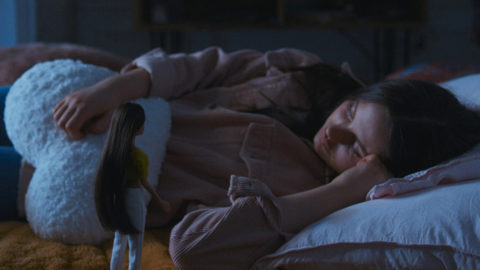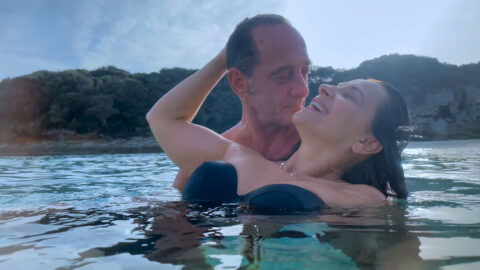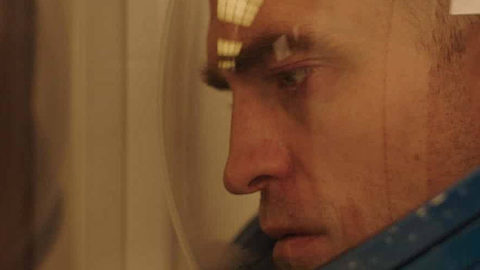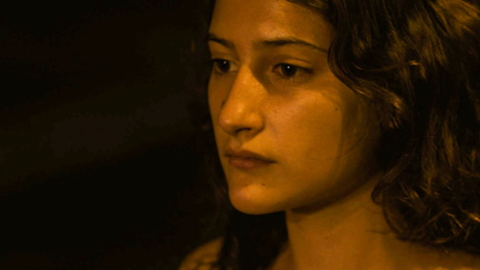Interview: Claire Denis on Fire
This article appeared in the March 3, 2022 edition of The Film Comment Letter, our free weekly newsletter featuring original film criticism and writing. Sign up for the Letter here.
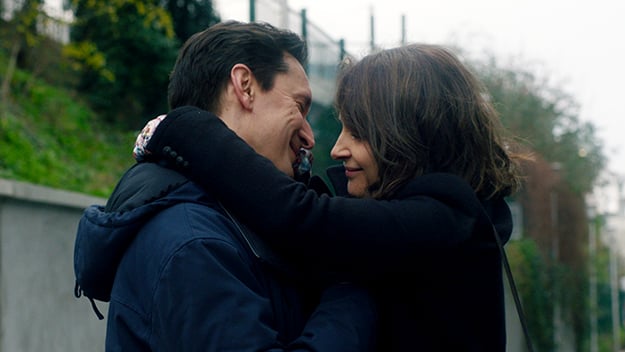
Grégoire Colin and Juliette Binoche in Fire (Claire Denis, 2022)
When Sara (Juliette Binoche) glimpses her old lover François (Grégoire Colin) by chance on the street for the first time in years, the sight of him hits her with physical force. No matter that she is seemingly happy with her current partner, Jean (Vincent Lindon)—the passion and sting of the past resurge in ways she cannot control, jolting her out of the comforts of coupledom and into a reckoning with her own desire. Although Sara is undoubtedly the center of the film, in the romantic triangle that structures Claire Denis’s Fire, every side is as charged as the others: François and Jean each offer Sara different forms of love, one torrid and the other secure, but the two men also share a history of (business) partnership and betrayal that infuses the relationships among the trio with added complications.
With Fire, Denis continues her collaboration with author Christine Angot, with whom she wrote the screenplay for 2017’s Let the Sunshine In. The new film, based on Angot’s 2018 novel Un tournant de la vie, is something of a spiritual sequel to the earlier work, and not only because Binoche returns in a starring role. Both films depict the tumultuousness of a fiftysomething woman’s erotic and emotional life with generosity and without judgment, refusing to deliver endings that would confirm either her fulfillment or her desolation. Some might grumble that these are minor works from a filmmaker who has elsewhere grappled with epic subjects and adopted more experimental forms. But Denis offers good reason to dispense with the gendered hierarchy of genres implicit in such a position. In Fire, she stays close to the bodies of her actors, eliciting performances that capture the complexity of human relationships, and reminding us that sometimes, feeling free can be more important than feeling happy.
This film has a few different titles depending on the language or the territory. In the United States, it’s being released as Fire, while elsewhere it’s called Both Sides of the Blade. In the French title, Avec amour et acharnement, I was very struck by the latter term, “acharnement,” which means persistence or doggedness. I wonder what the relationship is between persistence and desire in this film.
It’s a strange thing, this title. There was a working title, but there was no [actual] title. And one day—we were shooting very fast, it was not a big-budget movie—Juliette [Binoche] said, “How are you doing this film?” We were overwhelmed every day. I said, “Avec amour et acharnement.” With acharnement because it was fast. Vincent [Lindon] said, “That’s a good title for us.” And I kept it in the editing room. But then I thought that I didn’t like the translation in English. With love and…
And what? It doesn’t quite translate.
In acharnement, there is flesh. Then Stuart [Staples of the Tindersticks] sent me the song, “Both Sides of the Blade,” and I loved it immediately. I thought it was the best title ever.
Both Sides of the Blade makes sense as a title, because the film really is about two different kinds of love.
Exactly.
I think we can imagine other films that would champion one form of love and condemn the other, but I have a sense you’re not interested in that.
I think it came very naturally. I was speaking with Christine Angot, even before she wrote the novel [Un tournant de la vie]. We were discussing our own lives. I think we are two kinds of desperate women—very different, but… We were sharing feelings. It came from my character and her character. I understood everything: I would be like Sara, I would not resist. I would like to be free to make my own decisions. It’s not because you love someone, because you live with that person and give every day and every night to that love, that suddenly a memory doesn’t have the power to knock on your door.
The moment when she sees François again is very physical: it shows that there’s something beyond explanation, beyond rationality, in her response to him.
Juliette was right with everything: the way she expressed being lost and yet without tears, without using the normal gestures of feminine tragedy. She was being a person.
It is really a film about a woman’s desire. One of the things I love about it is that there’s no sense of judgment against her.
Oh no.
I wouldn’t expect that from one of your films, but that’s what happens in many others. I was thinking about Hollywood melodramas of the 1940s, where a judgment always comes. Here, by contrast, there is such a sense of freedom.
A judgment or a sort of happy ending [always comes]. Maybe Sara has lost everything, and maybe François also. But to judge? No.
The film is structured as a love triangle. Most obviously there are two love stories: Sara and Jean, and Sara and François. But I wondered, is there a third love story?
Jean and François also, I’m sure. Jean lost François because he took his girlfriend.
It was very striking to me that you chose not to show most of Jean and François’s interactions. The world of male friendship and that kind of homosociality remains out of frame for the most part.
Jean maybe feels guilty. It’s not clear, but it’s true he took Sara from François. As he’s older, he regrets it, maybe. I don’t know.
The absence of interactions between Jean and François is one of many ellipses in the film. We see photographs of Sara with a young girl about whom we never learn anything. I thought it was interesting that you chose not to represent her life as a mother, since it is often the case that mothers are never given the space to be anything else but mothers.
Actually, Juliette regrets that there was not a scene with the daughter. I shot a scene of the daughter spending a weekend with her, but I discovered it was killing something. Suddenly, Sara was abandoned to a world of not being able to tell her daughter about the kind of dire straits she was in. It was like saying, “You see, she is also a good mother!” In the editing room I said, “No, no, no, no. This is not possible.”
In some ways, the film takes up a classical narrative style, but there are also these big ellipses. What is the power of this kind of storytelling for you? It’s a big part of many of your films, especially L’Intrus (The Intruder).
For me, it’s like jumping in the void. An ellipsis is a space of time, or territory even, where something happens for the next scene. Even in the editing room sometimes, if there is no ellipsis in the way I shot, suddenly I feel, “No, no, no, no, let’s try this void.” The void, in a strange way, doesn’t contradict linear storytelling but makes a shock. And I know in my own life, I live every minute, every day, day by day, and sometimes something happens in another level of time.
You mentioned L’Intrus. Three weeks ago, someone called me in the editing room and said, “Hello, Madame Denis. I’m a doctor from the hospital of Toulouse.” He told me he was the doctor in charge of finding out who to tell that [actor] Michel Subor had died in a car crash. Michel had been in a coma for two weeks. He had no relatives; he had no papers. And suddenly somebody told the doctor that Michel worked with me, and he found me on Instagram. On Instagram I do very little, but I had posted a picture of Michel. I was in the editing room, shocked, in tears. When I was shooting in Panama, we talked often. I told him, “Come, you will rest in Panama, in the warmth by the sea.” I was not aware that he was too weak, that he was in a state of crazy freedom, an exit from life. I realized that Michel’s death was a huge ellipsis in my relationship with him. I was living in another time, and suddenly he died without me knowing, without me being aware. An unknown person called me from the morgue of a hospital and I thought, this is such an ellipsis. Because I was aware of Michel’s age. I was taking care of him, in a way. I would never abandon him. But I did—unwillingly, really.
In this film you work with several actors you have worked with before, like Grégoire Colin. I was struck by his physicality in this film, especially since in my mind he’s always the actor from your earlier films. I wonder about what it’s like to work with someone over such a long period.
He’s mine forever and I’m his forever. He was my baby, in a way, then a young man, and now he’s a father of two. He’s there, always.
In this film, he plays a man from the past, but he’s also a man from your past and the past of your cinema. It made me think about whether there’s also another thread in the film about aging.
Of course. Of course.
Sara’s desire for freedom and change is also tied to a certain moment in her life.
It’s true. And Alice Houri, the girl in the office—she was Nénette [in Nénette and Boni]. She had just given birth to a baby three weeks before shooting. That’s why we had to stop filming at some point. The milk was coming out! [laughs] I had never worked with Bulle [Ogier] before, but because I worked with Jacques Rivette, it was like she was also coming from my past. I know Vincent was staggered that she would [play] his mother, but he was so happy.
The film also features radio guests who are real people playing themselves.
Lilian Thuram. He was a soccer player and a part of the French team’s first World Cup win in 1998. He was the one who made France win. He was not supposed to be the one to score, but he made two goals against Croatia. He was so surprised. I always remember that. And then for some reason, I made a little documentary about Guadeloupe [Thuram’s birthplace], and we became friends. Now, he gives all his time to go to schools to help young kids. He was a hero for many young French people, you know. The other woman [Hind Darwish] is a teacher in Beirut, who desperately fights.
Erika Balsom is a reader in film studies at King’s College London and the author, most recently, of Ten Skies (2021, Fireflies Press).



